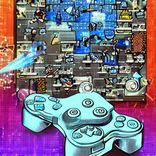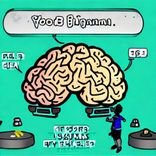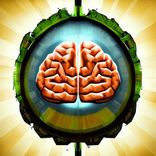Project Results
By focusing on gaming disorder, our main target groups range from young people (15-29) to youth workers, youth organisations, and policymakers.
We also want to reach out to the public, schools and universities, as well as local, regional, and national authorities.
Therefore, we want to offer the following results to each specific target group:
Young people
- 1 Playbook about gaming disorder;
- 1 Self-Evaluation Questionnaire for youth.
The MINDSET – Playbook for Youth targets young people and entails information on gaming disorder, risk factors, dangers, consequences, healthy and balanced gaming and ways to recognize the symptoms of gaming disorder. This way, it increases awareness of gaming disorder and helps young people protect themselves against problematic gaming behaviours.
The Guide was tailored according to the results of the desk and the field research across partnership countries and includes a summary of the results of the research; information on the identification and prevention of gaming disorder; as well as a list of organisations specialised in gaming disorder. This list can help young people explore the organisations specialised in gaming disorder and find the programs that correspond to their needs and gaming habits.
This shortened version of the handbook provides all relevant content for youth in an informal and adapted language. The original handbook is still used as main reference for in-depth information.
If you are a gamer, please assess yourself to understand if you need help
Youth workers and Youth organisations
- 1 Organisational change guide for youth organisations;
- 1 Capacity Building Program for youth workers;
- Assessment questionnaire for youth workers;
- 8 Action Sheets;
- 1 International Learning, Teaching and Training Activity.
The MINDSET Organisational Change Guide for Youth Organisations aims at providing information on the organisational changes that need to be made in youth organisations in order to meet the needs of young people with gaming disorder or at risk of gaming disorder, guidance on the strategies and methods that youth organisations should adopt for changing the way they address gaming disorders among young people, as well as innovative resources and tools that youth workers can use for helping young people struggling with gaming disorders.
The Organisational Change Guide for Youth Organizations is addressed to any type of youth organisation, including schools and entities that run after-school activities of all kinds (sports, cultural, religious), summer clubs, social groups, self-help groups, youth advocacy groups, or environmental protection initiatives, scouts, or service organisations. The Guide should be relevant and meaningful to all types of Youth Organizations, whether community or neighbourhood-based, state-run, national or regional.
The objectives of the Capacity Building Program for Youth Workers are to:
- Provide youth workers (YWs) the necessary knowledge on gaming disorder;
- Enhance the skills of YWs on identifying and preventing gaming disorder in youth;
- Familiarise youth workers with useful tools and methods that assist them in the process of identification and prevention of gaming disorder in a professional manner;
- Building the proactive attitudes/behaviours of YWs towards prioritised mental health;
- Increase the capacities of trainers to train youth workers on the materials produced.
In this regard, the overall guiding learning outcomes of the Capacity Building Curriculum are:
- KNOWLEDGE: provide YWs with the necessary knowledge on gaming disorder (GD);
- SKILLS: equipping YWs with practical tools and methods to actively counter gaming disorder by identifying (early) symptoms of GD, preventing their symptoms from becoming problematic, and assisting those at higher risk to seek professional support.
- ATTITUDES: developing the emotional intelligence and empathy of YWs that enables them to perform in complex settings with young people who might be at risk of mental health/GD.
- BEHAVIOURS: prioritising mental health and wellbeing in regular work with youth.
The curriculum consists of 7 main topics, each one representing one session that is 60 to 90 minutes. In addition, an introductory unit & an evaluation unit are included. This amounts to a total of 9 sessions to be organised within a 2/3-days program.
Each chapter of the Capacity Building Program is dealt with separately on the MINDSET e-learning platform at https://apps.succubus.dev/mindset/app/latest/?language=en.
By conducting the self-assessment test, the youth workers get a comprehensive overview of their competences and needs for further training and learning.
Lack of awareness and understanding: Many youth workers, educators, parents, and even healthcare professionals lack awareness and understanding of youth gaming disorder, making it difficult to identify and address the issue effectively. Gaming disorder is mostly handled as a subtopic in youth work and not under main focus. It is usually part of the work on general mental health and wellbeing
Insufficient funding for gaming disorder: Adequate funding is essential to support research, prevention programs, treatment services, capacity building, training and public awareness campaigns related to gaming disorder. Limited funding can hinder progress in addressing the issue effectively. It is important to map local and non-local fundings that can support the work on gaming disorder
Stigma and social attitudes: Stigmatisation surrounding gaming disorders can prevent affected individuals and their families and friends from seeking help. Negative social attitudes can also hinder the implementation of effective prevention and intervention strategies, both in youth work and in professional support
Parental and caregiver support: Parents and caregivers play a crucial role in addressing youth gaming disorder, but they often lack the knowledge, skills, and support needed to effectively manage the issue. They represent crucial lines of defence and care because not every young person takes part in youth work or non-formal activities
Co-occurring mental health issues: Youth gaming disorder often co-occurs with other mental health conditions, such as anxiety or depression. It is essential to address these underlying issues simultaneously to achieve successful outcomes. While gaming disorder can be an effect of other mental health issues, it can also be the cause of a different mental health issue
Industry responsibility and regulation: The gaming industry has a responsibility to promote healthy gaming habits and implement measures to prevent excessive and problematic gaming behaviours among young players. However, the major goal of the industry, like any other industry, is to make the most profit from purchases and subscriptions
Inadequate access to treatment, support, and assessment: Limited availability and accessibility of specialised treatment services for youth gaming disorder, coupled with a lack of reliable screening and assessment tools, present significant barriers to early identification, treatment, and recovery
Physical well-being and sedentary lifestyle: Excessive gaming often leads to a sedentary lifestyle, contributing to physical health issues such as obesity, musculoskeletal problems, and overall reduced physical fitness. Neglecting physical wellbeing can further exacerbate the negative impact of gaming disorder
Policy Maker
- Policy Recommendations;
- 1 Experience Roadmap
This Experience Roadmap compiles and synthesizes data gathered from the piloting of the MINDSET Capacity Building Programme (CBP) across partner countries. It aims to:
- Evaluate the effectiveness of the training.
- Highlight success stories, challenges, and good practices.
- Provide recommendations for improving the content and platform.
- Support scaling and sustainability of MINDSET in diverse youth work contexts.
This EU Policy Recommendations Report consolidates the results of policy workshops held in the participating countries — Ireland, Germany, Cyprus, Poland, Portugal, Austria, and Greece. By synthesising these national findings, the report offers a comprehensive overview of policy solutions that can be implemented at local, national, and EU levels to prevent gaming disorder, enable early identification, and ensure effective support for affected young people.
Please note that this document is delivered only in English.


